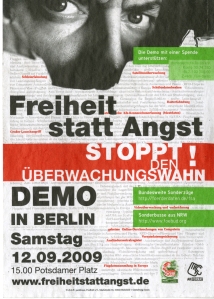Surveillance, monitoring, and control stickers in Berlin
- Published
- in Berlin, Surveillance, Technology/2.0
In 2006, the European Union adopted “Directive 2006/24/EC,” authorizing member countries the ability to obtain communications data including source, destination, type, date, time, length, device, and location of device. Data could be retained for six months to two years depending on certain variables. The measures were put in place in the name of national and international security and in response to acts of terrorism, including the attacks on the World Trade Center in New York City on September 11, 2001, train bombings in Madrid in 2004, and bombings in the public transport system in London in 2005. In Germany, the law went into effect in 2008, but was later voted unconstitutional in March of 2010.
Wolfgang Schäuble: Stasi 2.0
The man represented in the sticker “Stasi 2.0” is Wolfgang Schäuble, Germany’s Federal Minister of the Interior from 2005 to 2009 under Cabinet Chancellor Angela Merkel, and now Minister of Finance. As an advocate of communications data retention, Schäuble has been criticized for these electronic surveillance tactics and other forms of counter-terrorism. “Stasi 2.0” combines a reference to the former East German Ministry for State Security, i.e., the Stasi, and the phrase Web 2.0 as its modern iteration. During the Cold War era, Stasi secret police infiltrated every aspect of an individual’s life, including personal interactions with others at home, at work, and in public.
Freedom Not Fear
The sticker below for a mass demonstration in Berlin on September 12, 2009, states, “Freiheit statt Angst, stoppt den uberwachungswahn,” which translates into “Freedom not Fear, Stop the Surveillance.” The “Freedom Not Fear – Stop Surveillance Mania” demo in 2009 was part of European Action Day, in which Berlin and five other cities held protests against monitoring and surveillance by “big brother” government agencies and “little brothers and sisters” businesses. This was the third such annual demo in Berlin—one called for by an alliance of 150+ various political, civil rights, social, and cultural groups and drew thousands to the streets at Potsdamer Platz. A fourth demo in 2010 drew over 7,000 to Berlin, with additional demos in cities throughout Europe.
According to a press release[1] for the event, the organizers of the 2010 demo had an extensive list of demands to reduce monitoring, including:
- No Data Retention – either national, or European level
- Abolition of mandatory comprehensive collection of biometric data
- No RFID identification documents
- Protection from unnecessary data collection and spying in the workplace
- Introduction of an Employee Data Protection Act
- Modern data protection laws
- Consideration of data protection in the design phase of all public e-government projects
- No single student number (Schüler-ID/Schülerdatei)
- Specific privacy policies for universities and other educational institutions to meet the new requirements
- No massive central storage of personal employee data (ELENA)
- No systematic monitoring of payments or other mass data analysis in the EU (e.g., SWIFT), and no exchange of information with the U.S. and other countries without any effective protection of fundamental rights of citizens
- No information sharing sensitive data with the U.S. and other countries without any effective protection of fundamental rights
- No flat-rate and excessive registration of all air and sea passengers (PNR)
- No automated license plate monitoring and site acquisition or building upon it using technologies (e.g., Toll Collect)
- Reduction and greater regulation of video surveillance and banning the use of behavior recognition systems
- No secret searches of private computers, whether online or offline (e.g. Federal Trojan)
- No introduction of the electronic health card (health card), as currently planned form
- Providing transparency on the exchange of sensitive data by European police authorities
Demands also included detailed outlines regarding the evaluation of existing surveillance powers, a moratorium on new surveillance powers, and freedom of expression and information exchange on the Internet.
Hungary’s 2011 National Media and Communications Authority
Hungary has adopted a new law to create a National Media and Communications Authority (NMHH), which took effect on January 1, 2011, the same day the country assumed the rotating six-month EU presidency. “Under the new law, broadcasters and newspapers can be fined up to 200m forints (£615,000; $955,000) for violating ‘public interest, public morals or order’,” according to the BBC. Already, a small radio company is under investigation for playing “Warning, It’s On” by rapper Ice-T at 5:30 p.m. local time, saying the song should have played after 9:00 p.m. The NNMH has the authority to regulate broadcast, print, and online media content, and groups all over Europe are expressing their concern, including the Organization for Security and Cooperation in Europe and Reporters without Borders.





